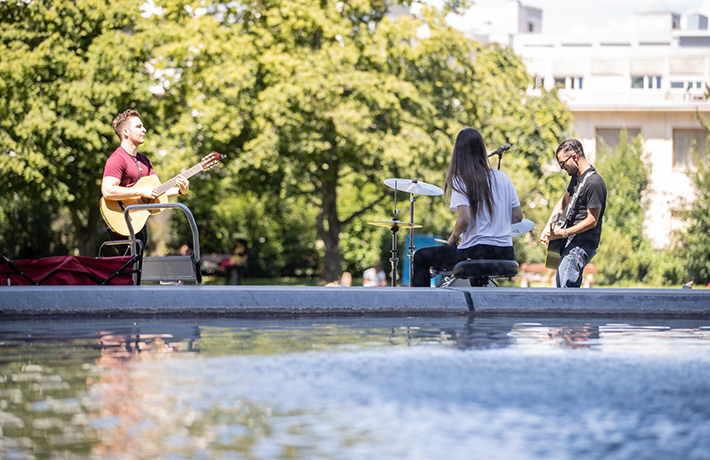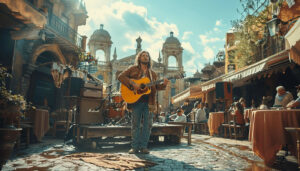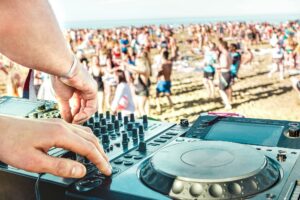
How to Discover Real Local Music When Traveling in Europe
Let’s be honest – when you travel through Europe, it’s easy to end up listening to the same Spotify playlists or catching the same touristy “folk” shows. But if you want to hear the real local music, the kind that people actually dance to in small bars and community festivals, you need to dig a little deeper. I’ve learned that the best sounds often come from the least expected places.
Forget the tourist traps – follow the locals

If there’s one rule to remember : locals always know where the good music hides. You don’t need a travel guide for that. In Lisbon, for example, I once skipped the big Fado venues (you know, the ones with fixed menus and expensive wine) and ended up in a tiny bar in Alfama. A woman just stood up and started singing, no mic, no lights – pure emotion. That’s what local music feels like. It’s not staged ; it just happens.
So, ask around. Bartenders, taxi drivers, even that person sitting next to you on the bus. Europeans are surprisingly proud of their regional sounds. Whether it’s a Breton fest-noz in France, a tamburitza night in Croatia, or a rebetiko jam in Athens, someone will point you in the right direction if you just show a bit of curiosity.
Look for the small festivals – they’re pure gold
Forget Coachella-style mega-events. The best local music festivals in Europe are the small, community-run ones. They’re usually cheap, often free, and full of surprises. Ever heard of the Festival Interceltique de Lorient in Brittany ? Or the Landshuter Hofmark Festival in Bavaria ? You won’t see massive headliners, but you’ll find bagpipes, fiddles, accordions, and a crowd that actually dances because they grew up with that music.
Honestly, these events are the soul of regional Europe. You’ll see grandparents waltzing next to teenagers wearing band T-shirts. There’s beer, local food, laughter – and zero pretension. If you’re traveling in summer, just google “folk festival” or “regional music event” with the country name. You’ll stumble upon gems you’ll never forget.
Don’t underestimate the power of small venues
Big cities like Berlin or Paris have their underground scenes, sure, but some of the most authentic European sounds live in tiny bars and village squares. I once walked into a smoky bar in Cluj-Napoca, Romania, and ended up listening to a band mixing jazz with old Transylvanian melodies. It was wild – something between Miles Davis and a shepherd’s flute. Totally unplanned, totally perfect.
Try to look up community centers, local theaters, or student cafés. In places like Porto, Ljubljana, or Riga, they often host open-mic nights featuring traditional instruments. It’s where you’ll meet the new generation keeping those sounds alive – in their own modern way.
Follow local radio and community media

If you can’t find events right away, tune into local radio stations. That’s a trick I use all the time. Radio BéO in Switzerland, Radio Folk in Poland, or even community stations in Ireland – they all broadcast the kind of music you’d never find in mainstream playlists. Plus, they announce local gigs, festivals, and even informal jam sessions. It’s an easy way to spot what’s happening while you travel.
Another idea : check community boards, Facebook groups, or even supermarket noticeboards. Sounds old-school, I know. But I once found a small Basque drumming workshop from a flyer on a café wall. No website, no ads – just people sharing their culture for the love of it.
Mix curiosity with respect
When you do find those moments – a street violinist in Prague, a Sardinian choir in a church, a folk-rock band in Budapest – take a second to really listen. Not through your phone. Not as background noise. Just… be there. Local music isn’t about perfection ; it’s about connection. You feel it in your chest more than you understand it in your head.
And honestly, that’s what makes traveling in Europe so special. Every region, every valley, every island has its rhythm. Some are wild, some are melancholic, but all are true to their roots. When you travel with open ears, you stop being a tourist – you become part of the story.
So, where will you start ?
Maybe in a pub in Galway, a street corner in Naples, or a square in Ljubljana. Wherever you go, listen for the sounds that aren’t amplified, that aren’t sponsored, that just exist because someone, somewhere, loves making music. That’s the real soundtrack of Europe – and it’s waiting for you to find it.

